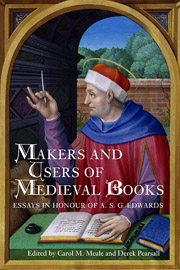Preface
Published online by Cambridge University Press: 05 May 2014
Summary
We must begin with names. ‘Tony Edwards’ is the person to whom this volume is dedicated, but it is not a name that everyone will immediately recognize, particularly those who know him only from his published work, for he has made himself known in public, from the first, as A. S. G. Edwards. When he began his career, this was the manner in which most scholars, most men at least, named themselves. Fashions have changed, and given names, one, two, or more, are now almost universal. But Tony has held on tenaciously to his initials, perhaps because he has three of them. We do not believe that he did so in any spirit of emulation of or desire to align himself with ‘Edwards A. S. G.’, the Edwards Active Strain Gauge well known to Google, an advanced form of technical engineering equipment which guarantees the vacuum conditions needed for the manufacture of certain precision instruments, such as aircraft engine turbine blades. It seems strangely apt as an analogous form of ‘A. S. G.’, whether one thinks of the ‘active strain’ involved as what he exerts upon himself or upon other people. The analogy fails, of course, when one comes to the creation of vacuum, where it works back to front, for Tony's work has essentially been to fill the vacuum that once existed in the study of manuscript history.
- Type
- Chapter
- Information
- Makers and Users of Medieval BooksEssays in Honour of A.S.G. Edwards, pp. xi - xivPublisher: Boydell & BrewerPrint publication year: 2014



